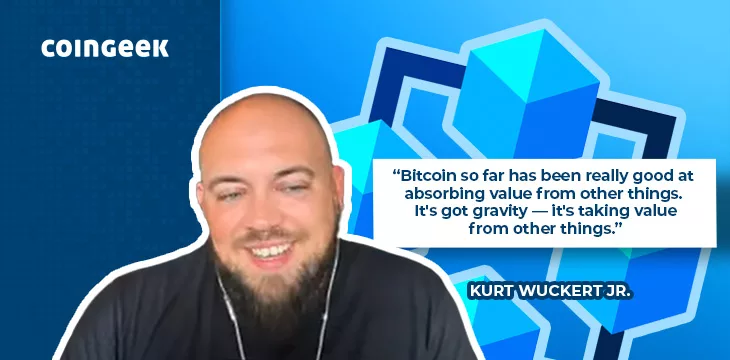Kurt Wuckert Jr. recently appeared on the Wall Street Technologist podcast to talk to Jerry Chan, founder of BSV company Frobots. The pair spoke about the history of Bitcoin, what mining is, and Bitcoin’s energy usage.
Bitcoin history and the doxing of Dr. Craig Wright
Wuckert begins by saying he’s always had a thing for history, and combined with his natural interest in computers and technology; it was natural for him to become interested in the history of Bitcoin. During the Bitcoin Civil War, he tells Chan that he heard many lies repeated with misquotes like “not your keys, not your coins” attributed to Satoshi Nakamoto. He wanted to set the record straight, so he focused on Bitcoin history and ended up becoming Chief Bitcoin Historian at CoinGeek.
Focusing on a vital part of Bitcoin history, the story of how Dr. Craig Wright was outed as Satoshi Nakamoto, Wuckert tells Chan that he disappeared partly because of getting divorced, which happened partly because of the time and resources he dedicated to Bitcoin. On top of this, Dr. Wright was being audited by the Australian Tax Office, and before long, he was dealing with server hacks and a rogue employee, Jamie Wilson, attempting to extort him after he figured out he was the inventor of Bitcoin.
In the events that unfolded after Wired and Gizmodo outed Dr. Wright, Wuckert says that Robert McGregor, an entrepreneur who had become involved in all of this, was super keen to commercialize the coming out of Satoshi and set up things like book deals, movie rights and even a potential sale of his intellectual property. This did not go well, given Dr. Wright’s aversion to the limelight, and McGregor faded from the picture. nChain was formed which allowed Dr. Wright to return to his comfort zone of inventing and working in peace.
Wuckert recalls several times he has asked Dr. Wright on-the-spot questions about technical issues related to Bitcoin and how he has answered in detail multiple times without missing a beat. He finds it highly unlikely that someone would be able to do this if they weren’t the inventor of the system. Chan says he has had a similar experience; he asked Dr. Wright why there were 21 million Bitcoins, and he answered that after each halving, the block subsidy reflects the remainder of bitcoins left to be mined percentage-wise. Other so-called experts Chan has asked had no satisfactory answers to this question.
GorillaPool, Bitcoin mining, and energy usage
Wuckert is one of the founders of the Bitcoin mining pool GorillaPool. Chan pivots the conversation to this and asks him what Bitcoin mining is and what GorillaPool is trying to achieve.
Wuckert explains that miners build blocks, check for double spends, and enforce network rules. That’s their job, and that’s what GorillaPool does. He doesn’t like the term ‘mining’ because it implies digging for something scarce, which is part of the widespread misconception about Bitcoin, and he prefers to think of it as a rule validation and transaction processing service.
Chan asks for an overview of what proof of work is. Wuckert admits there’s no really good definition, but he gives an analogy; imagine someone’s time is extremely valuable, and they ask you to knock 10,000 times if the reason you need to see them is really important. Requesting this weeds out those who aren’t serious. Eventually, it incentivizes someone to build an automatic door knocker, and that’s what ASICs are. Essentially, you have to prove you care enough to do the work and bear the costs of participating.
Right now, GorillaPool runs the mining pool directly. They sell ASICs and host them as a service. Wuckert thinks the data is where the real value lies, and it’s being overlooked by many in the market. He thinks Bitcoin’s data storage and transmission capabilities allow us to create a more secure peer-to-peer internet. However, the tooling wasn’t there to allow businesses to use Bitcoin this way, so GorillaPool built some of it, e.g., JungleBus. Basically, this tool assigns some logic to the data on the blockchain, such as setting data categories.
What about Bitcoin’s energy footprint? Is it justifiable? In Wuckert’s view, it will continue to trend up for a while before ultimately trending down. The price can’t go up forever, and the subsidy is getting smaller, so there’s no reason to keep using these costly resources to chase diminishing returns forever.
What would Wuckert say to Greenpeace types? He says it’s a difficult one because it involves politics. The first step is getting everyone to agree that a more efficient economy is a good thing. Things like hospitals use a lot of electricity, so doing so is not in and of itself a bad thing. Likewise, the economy has utility, and it’s worth it to do things with greater efficiency. Bitcoin can also create incentives to liberate sources of energy that wouldn’t otherwise be accessed.
Watch: Jerry Chan talks NFTs, Bitcoin, and compliance
New to blockchain? Check out CoinGeek’s Blockchain for Beginners section, the ultimate resource guide to learn more about blockchain technology.










